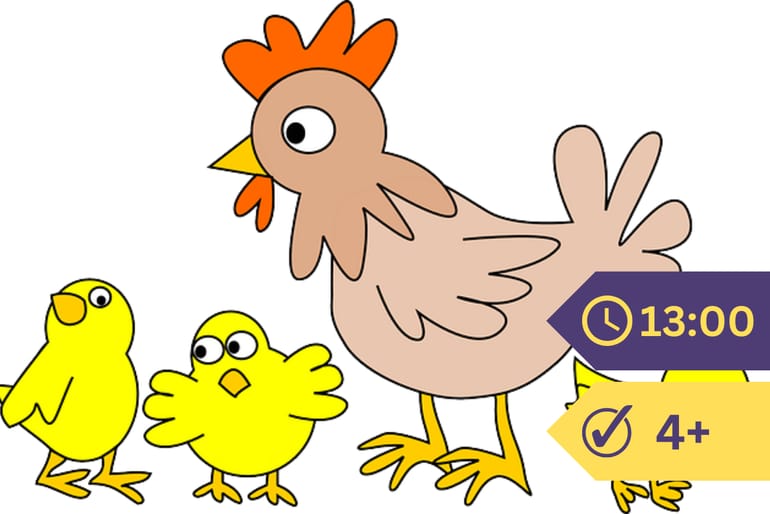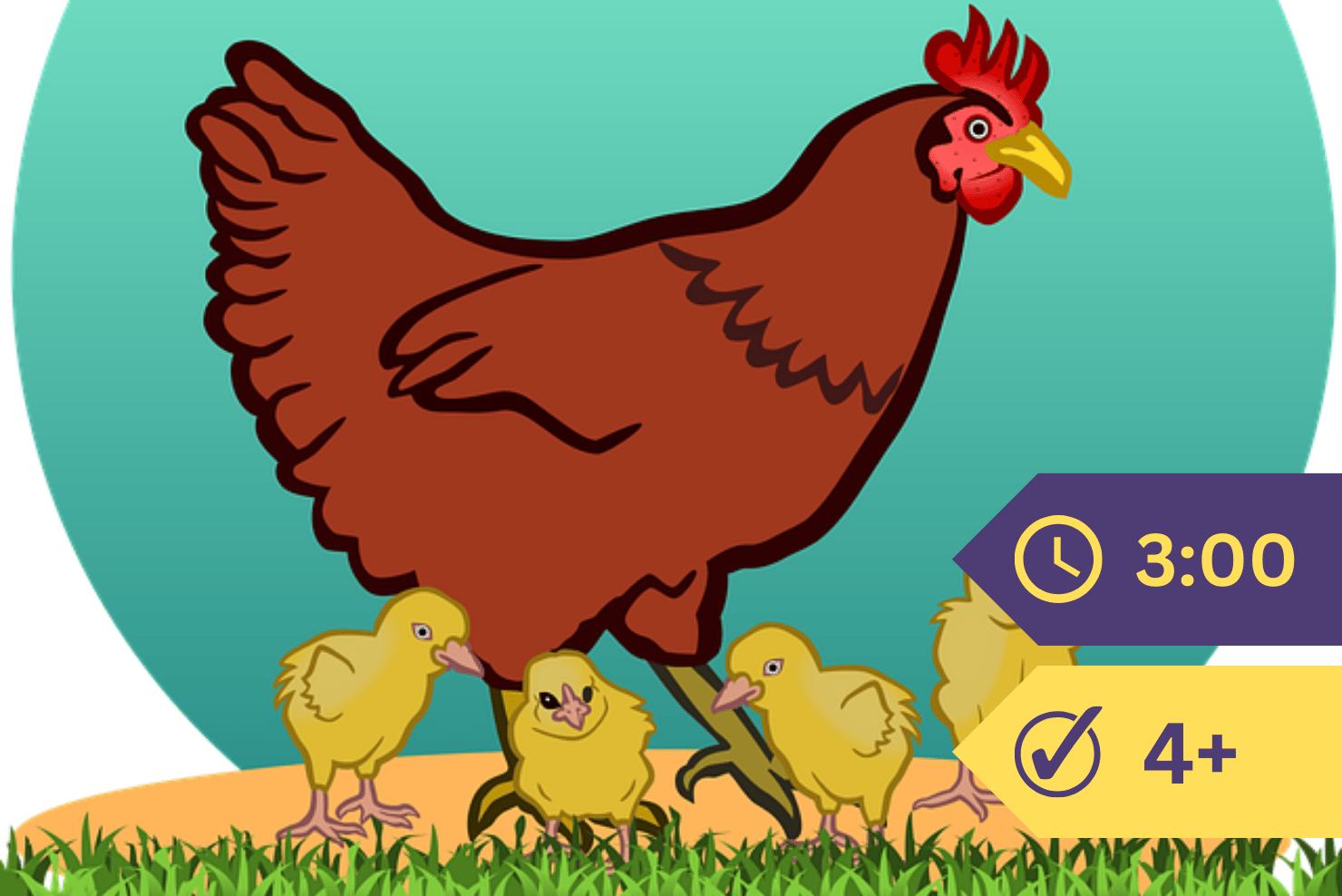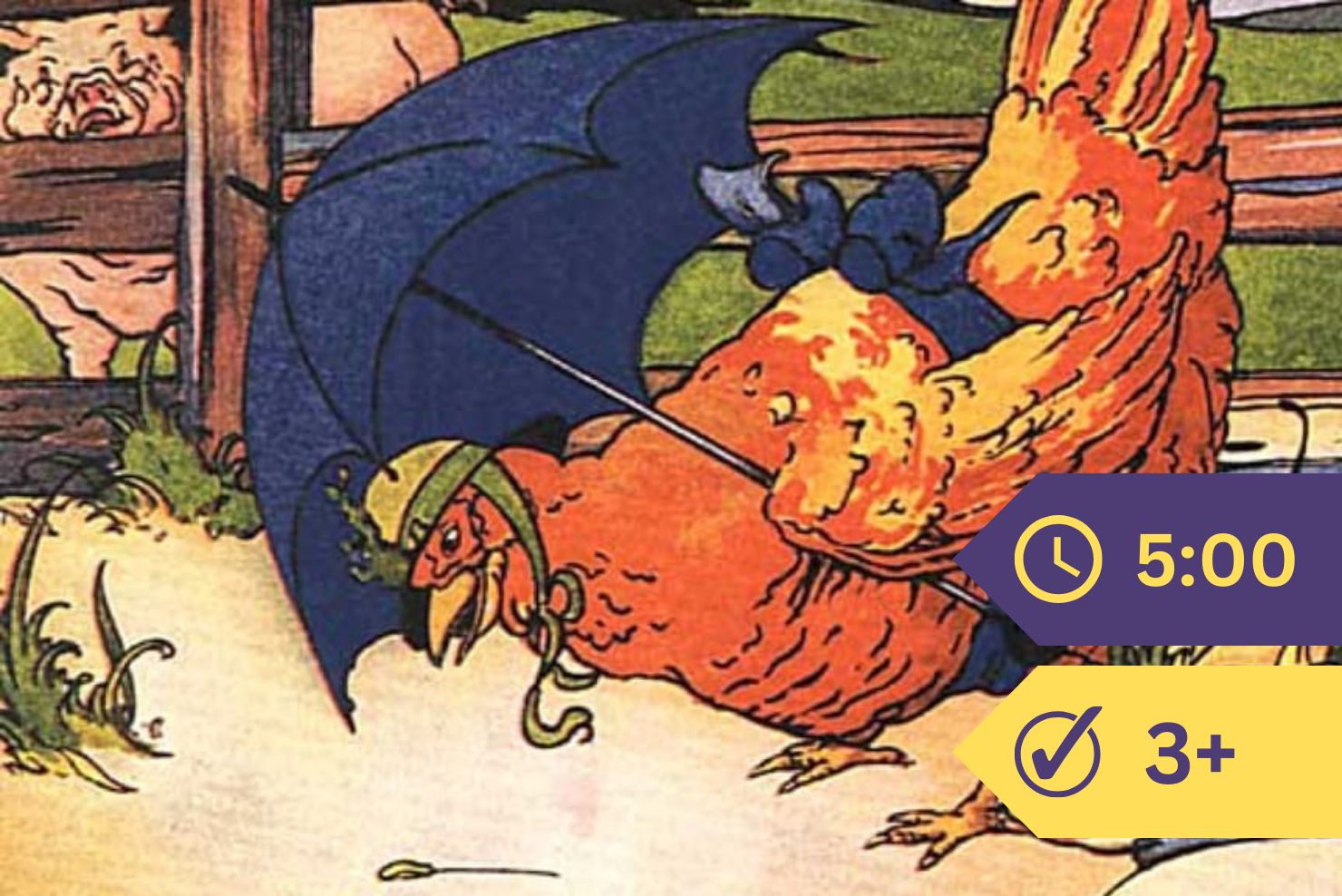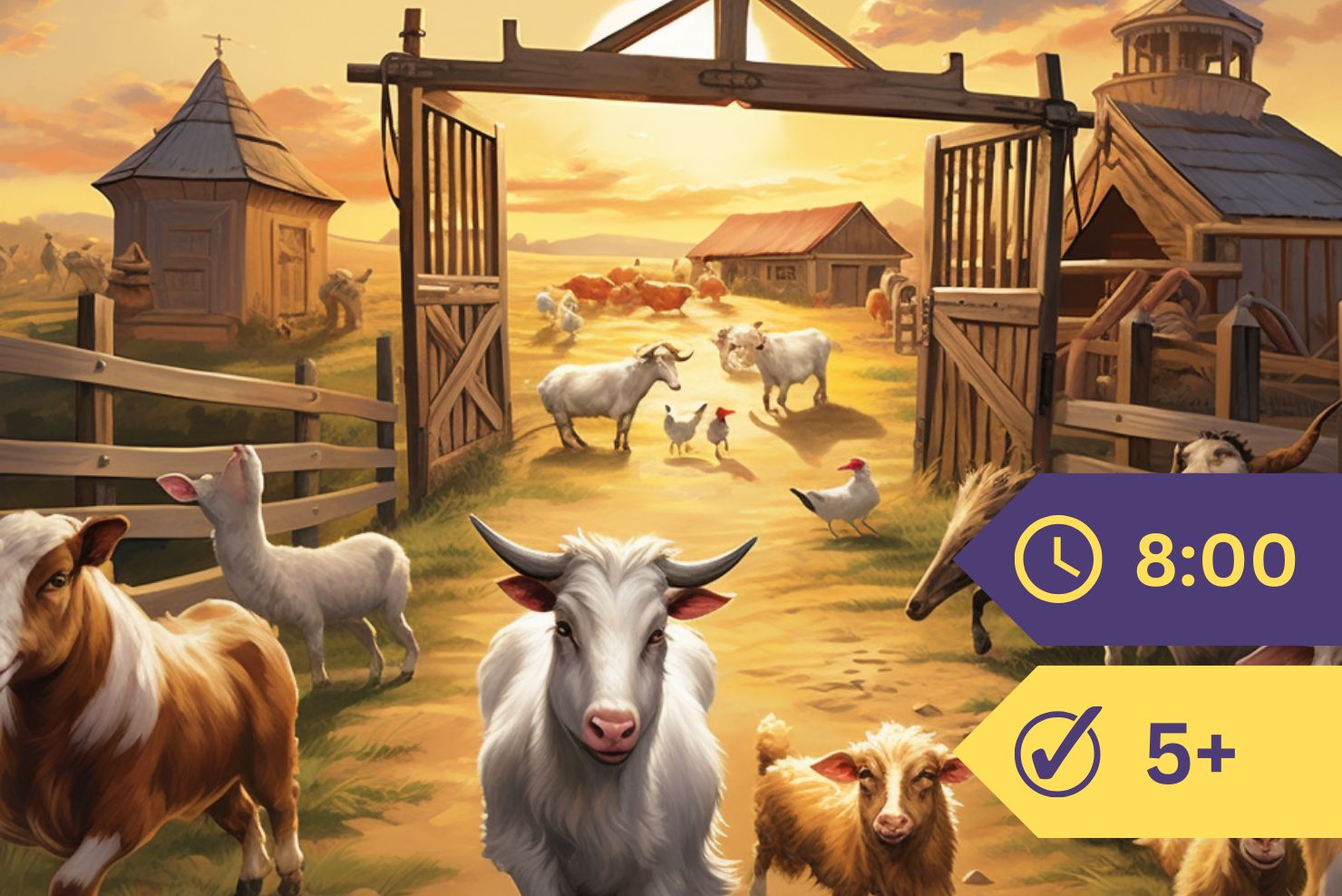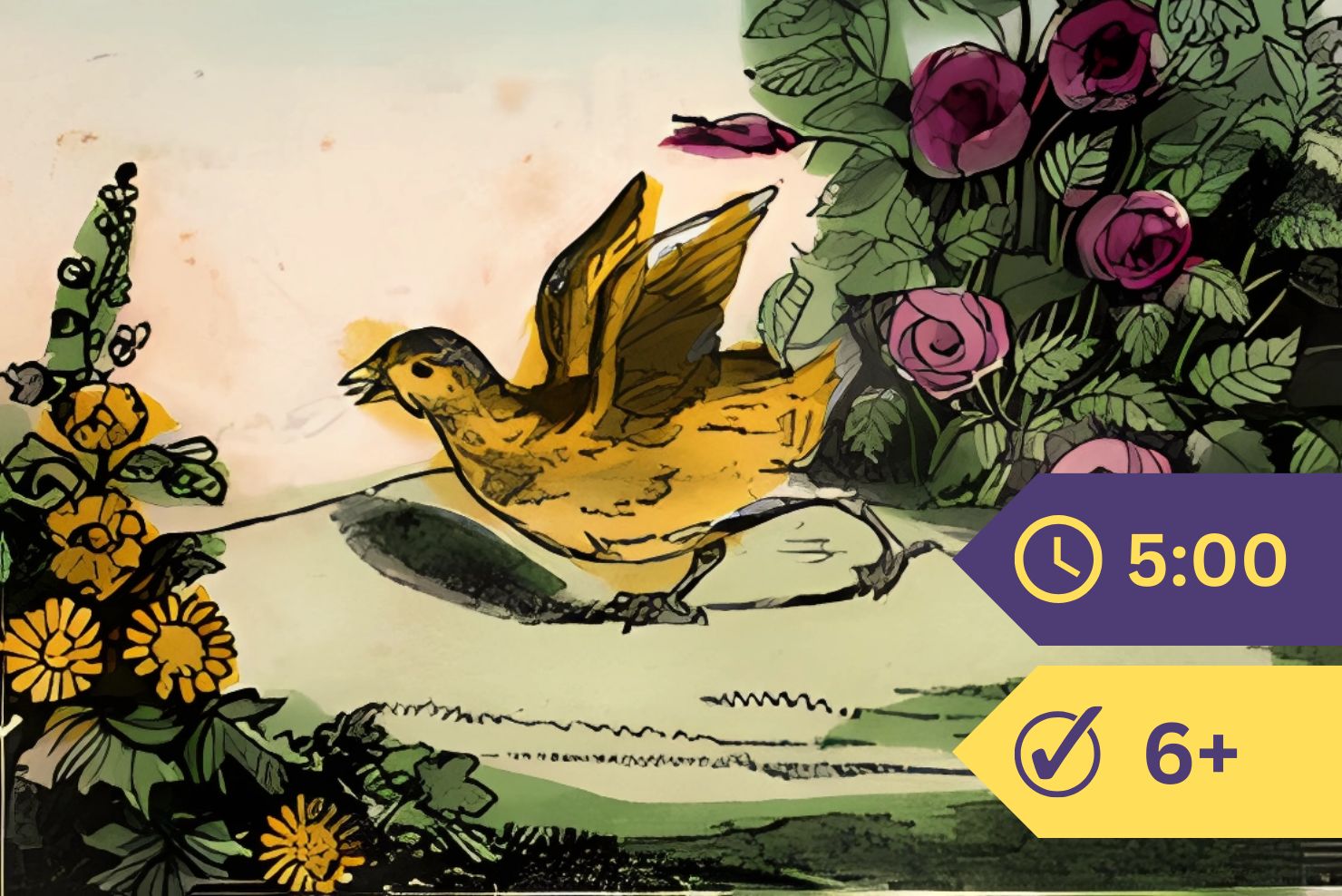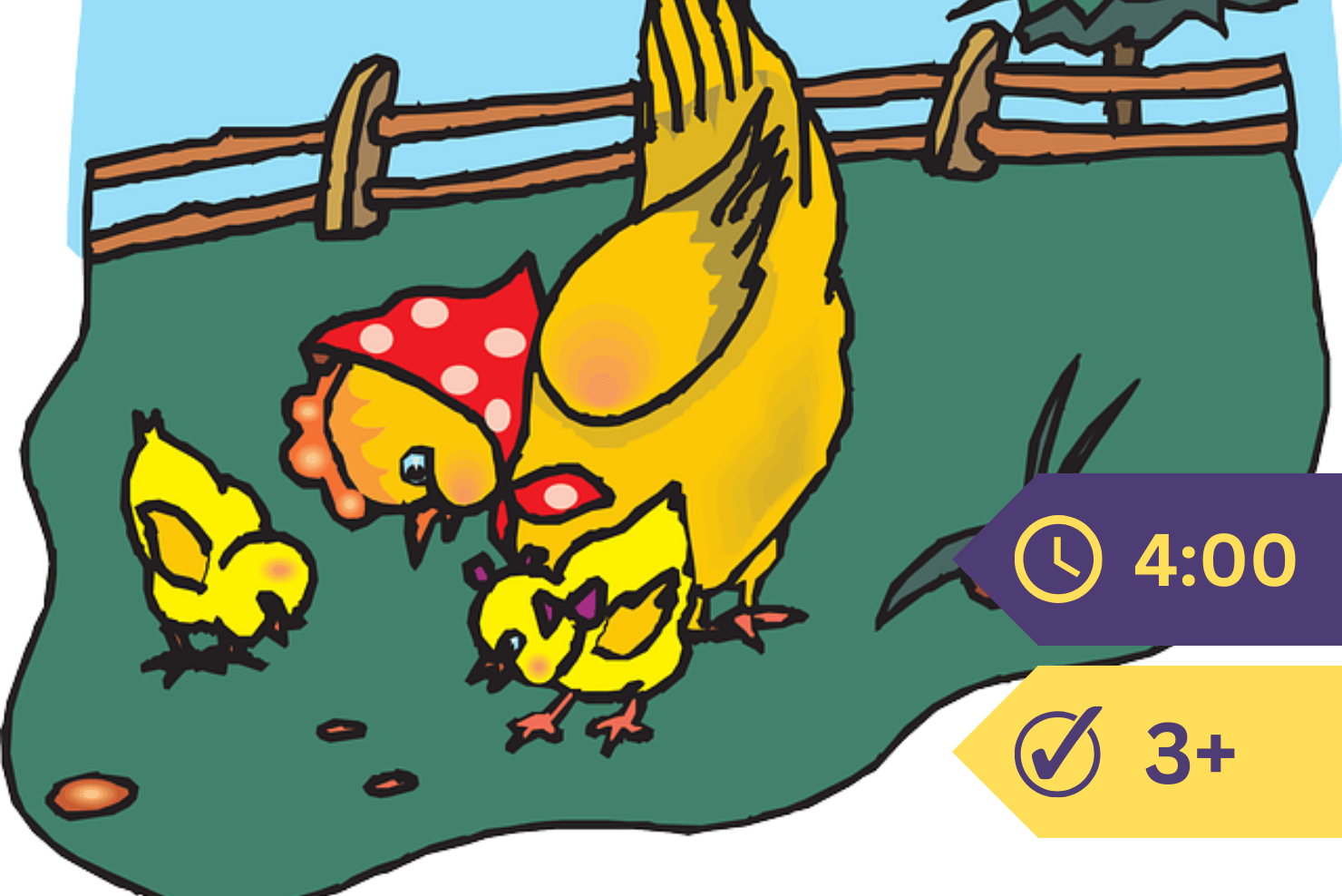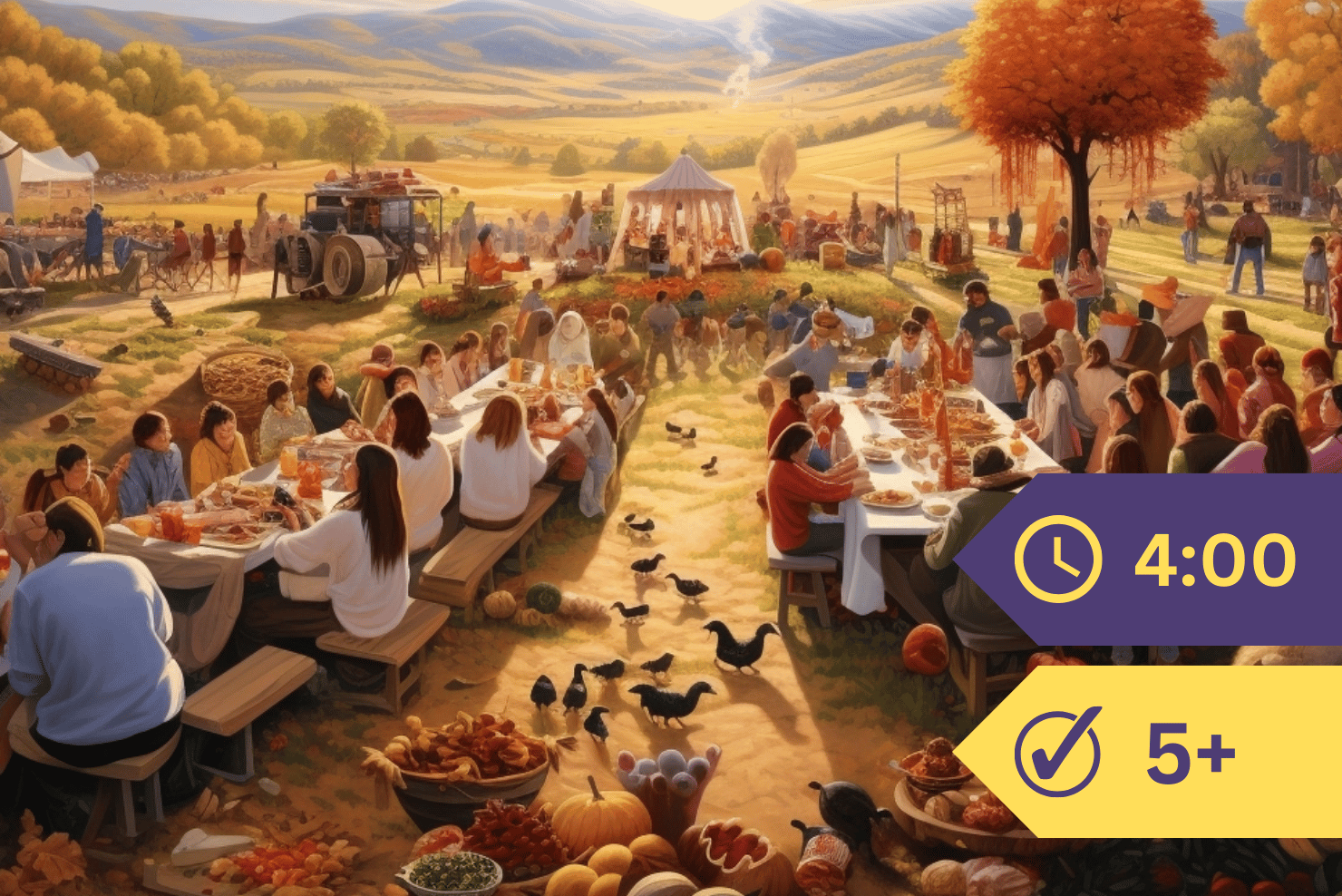Her name was Speckle because her white feathers were speckled all over with black. She had just as many eggs in her nest as you have “merry little men” on your hands, and her nest was in a wooden box in the barn. The box was filled with hay, so it was soft and warm for the eggs to lie on. There was something soft and warm over the eggs, too. What do you think that was? Why, Speckle herself! There she sat on the nest, having stepped in very carefully, so as not to break the eggs.
All day she stayed there; and even when the cows and horses came into the barn, and the other hens went to roost for the night, Speckle sat as still as ever, caring for nothing but to keep the eggs warm. The next morning, before the farmer came to the barn, Dobbin, the big horse, poked his nose out of his stall and neighed to Speckle.
“I never saw you there before,” said he. “What are you doing?”
“I am keeping my eggs warm,” said Speckle cheerily.
“Moo-oI” said the old red cow. “Are you not in a hurry to get out into the fields where the new grass is so fresh and green?”
“Oh, no!” said Speckle. “I would not leave my eggs. I must stay here and keep them warm.”
By and by the farmer came into the barn.
“Why, is that little Speckle?” said he, walking up to the corner where the box was. Speckle had never been afraid of the farmer before, but now she felt so anxious about her precious eggs that she made a strange noise in her throat and bristled up her feathers.
“There, there,” said the farmer kindly, stepping away. “I won’t touch your eggs. Don’t be afraid of me;” and he went about his work in the barn.
The cows were milked and turned out to pasture; the horse was harnessed to the cart and went out to do his day’s work. The barn was very quiet. Speckle was left alone, but only for a short time. Fritz, the farm dog, strolled in and looked at her with surprise.
“The rest of the hens are having their breakfast,” he said. “Little Phoebe is giving them a regular feast of corn. Hurry, or you will not be in time!”
“I cannot go,” said Speckle, though she was really very hungry. “I must sit here and keep my eggs warm.”
Fritz was so astonished that he did not know what to say.
“I suppose I shall have to go sometime,” said Speckle, “for I must not starve; but I will stay here a bit longer.”
Fritz put out his paws and stretched himself, and then lay down on the sunny barn floor to think; but it was so comfortable that he fell asleep instead.
Not long after, some swallows flew into the barn, and one of them, swooping down with a sudden dive, came so close to Speckle that her swift wings fanned the patient sitter. Speckle was startled, but only for an instant, for the swallow folded her wings and rested on the edge of the box, looking at Speckle in a friendly way.
“I know why you sit there,” she said. “Isn’t it a beautiful secret, the secret of the eggs? My mate and I have almost finished mending our nest — one we found up high there — and I shall soon have some eggs to keep warm just as you have.” Twittering thus, the swallow seized a wisp of hay and darted away, evidently feeling too busy to make a longer visit.
Speckle looked after her with bright eyes, but the swallow was soon out of sight in a dim corner far above Speckle’s head. The hours passed, and it was night again. Speckle had only been off her nest once to get a little food and water when she was so hungry and thirsty that she could not wait any longer. Her legs felt very stiff and cramped, and it seemed strange to her to be sitting there on a nest all by herself, instead of being on the perch in the henhouse with her friends. But she was contented and glad and felt that there was nothing in the world that could make her leave her precious eggs.
The next day, little Phoebe came running into the barn. “Where are you, Speckle?” said she, peering about in the corners. “Oh, here you are, you dear thing! Father said last night that you had a nest here. I’ve brought you some breakfast and a nice little pan of water.”
Speckle really did not know how to say “thank you,” but she felt like it, I assure you, not only that day but many times after, for little Phoebe came every day and brought corn or meal and filled the little pan with fresh water, leaving them very near to the wooden box so that Speckle had only to hop out to get them and could be back again on her eggs in a trice, instead of having to look all about for something to eat.
The old kind of life when Speckle had run about the farm all day and roosted on the perch at night seemed long past, and it was now three weeks that she had been living in this new way — sitting on her nest night and day, and with kind little Phoebe bringing her what she needed to eat and drink.
And now, at the end of the three long weeks — twenty-one days — a most wonderful thing happened. Speckle heard a faint little sound which seemed to come from the eggs beneath her breast. It was certainly like the sound of an eggshell being broken. Speckle listened and waited. Soon she actually felt something moving beneath her, and then she knew instantly what had happened. Do you know?
A little chicken had come out of one of the eggs. It had been growing inside the shell all the twenty-one days, until, being ready for life in the world, it had broken its shell and crept out! Before long, there were several others fidgeting about in the nest, as one after another they broke open the pretty white houses in which they had lived so long. And at last, there were ten cunning baby chickens covered with bright yellow down, stepping about on their wee bits of legs and staring at the new world with round, black eyes.
Speckle could scarcely contain herself for joy. All these pretty creatures were hers — her very own! She began to cluck softly — a little song she had never sung before and yet knew perfectly from the love in her heart. And the little chickens, as they listened, nestling under their mother’s soft breast, chirped in answer; and though all they said was “peep, peep,” it made Speckle happy to hear them.
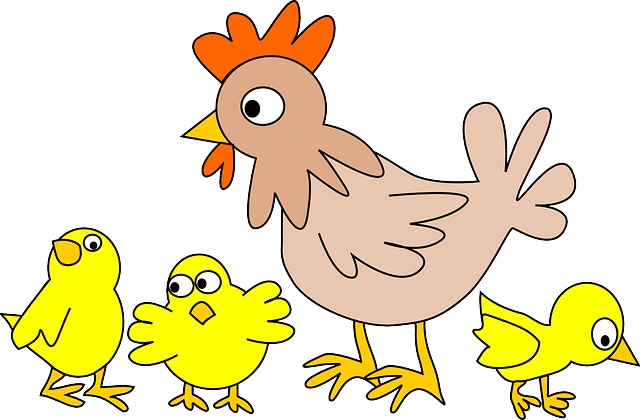
After she had cuddled them long enough and they were ready to take a walk, Speckle started out as proud and happy as a hen could be. Fortunately, the barn was not far from the house, or it would have been too long a walk for the chickens. What a walk that was! Speckle found something to cluck about every step of the way, and the chickens looked in wonder at all the strange new things. They found it a great comfort to keep calling to their mother and to run very close to her many times.
On the way from the barn to the house, they met the farmer driving old Dobbin. Speckle chuckled loudly to the chickens for fear one might get in the road and under the horse’s feet. This attracted the farmer’s attention. “Ho, ho! Speckle! That’s a fine brood,” he said, counting the ten. Dobbin said nothing, but rolled his eyes around toward Speckle with an expressive glance that meant as much as the farmer’s kind words.
Speckle led her yellow train on toward the farmhouse. The pasture was on one side of the road, and Speckle chose to walk on that side, hoping that some of the cows would see her. Yes! Lady Jane, the oldest and the leader of the herd, was standing near the bars. Again Speckle clucked very loudly to her chickens, for she was afraid they might run into the pasture. Lady Jane looked up from the tender grass she was cropping. She made no attempt at speaking, any more than Dobbin had, but by the way she put out her head and took several deep breaths, and switched her tail, Speckle knew that Lady Jane noticed her chickens with due astonishment and admiration.
But Fritz, the dog, was more surprised than either the horse or the cow, for he had only been on the farm a short time, and these were the first baby chickens he had ever seen. He thought it must be that Speckle had found a whole troop of canary birds like the pretty creature that lived in the cage, and which Phoebe loved so much. So off he ran ahead of Speckle, barking loudly. The chickens were greatly frightened at this noisy monster and ran to their mother, in front of her, behind her, and under her, in their panic. But she clucked soothingly and presently succeeded in quieting them. So when Phoebe opened the door to see what Fritz was barking at, Speckle and her brood were walking quite properly across the dooryard, and Fritz stood wagging his tail and looking up into Phoebe’s face, as if to say: “There! Are you not glad I called you?”
Phoebe shouted with surprise and delight. She was soon close to Speckle and was so quiet and gentle that Speckle could not be afraid of her very long, and even the chickens forgot to be afraid when Phoebe brought a nice pan of meal for them.
While they were eating this, the farmer came up carrying a new coop. He set it down under a cherry tree. “Father! Is that for Speckle?” asked Phoebe. “Yes, it is for Speckle,” said the farmer. “She would trot those chickens all over the farm if I did not put her into a coop.”
So, before Speckle knew what was going on, she found herself looking out between the slats of the coop. She called anxiously to her chickens, and though they ran about wildly for a little, they soon found their way into the coop and under her wings. They rested there a few minutes, but dear! dear! there was so much to see outside, and they were such lively little creatures that before long, they were out again. Speckle watched them and talked to them all the time, stretching her head away out between the slats of the coop and calling the little ones back if they were running away.
Suddenly, a bird passed by, flying low, and Speckle looked up in alarm lest it might be something to hurt her chickens. Again the bird passed, and this time, Speckle saw that it was her friend, the barn swallow, the one who had spoken to her when she was sitting on her eggs.
“Look, look! Look, look!” called Speckle in great joy, delighted that the swallow should see her treasures; and the swallow twittered as joyously in return, for she, too, had glad news to tell.
“Happy, happy, happy!” she chirped. “Long I sat on my nestful of eggs; now it is a nestful of birds.”
And away she darted to the barn, whither she had been flying, as full of rejoicing over her baby swallows awaiting her return as Speckle was over her yellow darlings.

